16. A Reebop
with the genotype Aa is
__________________ for antenna genes.
pure-breeding OR hybrid
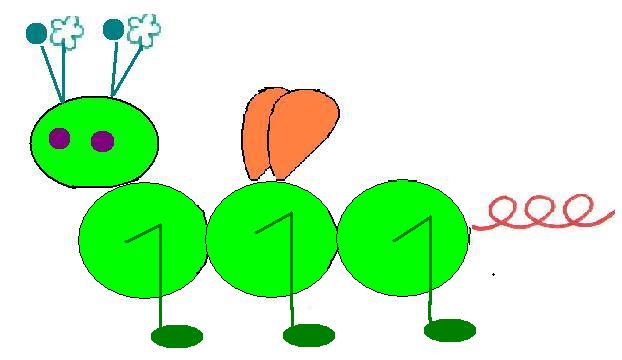
Image by Riedell
GENETICS REVIEW
Fill in the answers on your
answer sheet. You can check answers
with your teacher at the end.
1. Who is called the “Father of Genetics”?
2. The different alternatives or choices for a gene are called _____________.
3. If you cross two DOMINANT looking parents and get a RECESSIVE looking offspring, the parents must both be _____________
A.
HOMOZYGOUS for the trait
B.
HETEROZYGOUS for the trait
C.
PURE for the trait
D.
IMPOSSIBLE; Dominant looking
parents can’t have a recessive looking offspring
4. Crossing organisms from the F1 generation produces the _____
generation.
A.
P2
B.
F2
C.
P1
D.
None of these-you
can’t cross F1 organisms with each other!
5. The passing of characteristics from parent to offspring is called _______________.
6. A gene choice that MASKS ANOTHER choice for a trait is called _____________.
7. Which of the following genotypes is HETEROZYGOUS?
TT bb Mm RR gg
8. ____________ is another name for HOMOZYGOUS.
9. PP and Pp pea
plants both have purple flowers. This is an example of _________
A.Complete dominance
B. Incomplete dominance
C. Codominance
10. Which of the following genotypes is HOMOZYGOUS?
Bb Mm Rr TT Ee
11. In pea plants, Tallness (T) is dominant over shortness (t). Write the genotype of a PURE SHORT organism.
12. Red flowered plants crossed with white flowered plants producing PINK
flowered offspring is an example of ______________
A. Complete dominance
B. Incomplete dominance
C. Codominance
13. The way an organism looks is called its ______________________.
14. A gene choice that is MASKED or HIDDEN BY ANOTHER choice for a trait is called _____________.
15. A red haired horse crossed with white haired horse producing roan (red and
white haired) offspring OR a blood type A mom and a blood type B dad having a
type AB baby are examples of __________________
A.Complete
dominance
B. Incomplete
dominance
C. Codominance
|
16. A Reebop
with the genotype Aa is pure-breeding OR hybrid
|
 Image by Riedell |
17. Crossing organisms from the P1 generation produces the _____
generation.
A. P2
B. F1
C. F2
D. None of these- you can’t cross P1
organisms with each other!
18. If a trait shows INCOMPLETE DOMINANCE which genotype must an organism be to
show the INTERMEDIATE BLENDED PHENOTYPE?
A. PURE
DOMINANT
B. PURE
RECESSIVE
C. HOMOZYGOUS
RECESSIVE
D. HETEROZYGOUS
19. A ________________ trait is controlled by two or more genes.
20. The branch of biology that studies how characteristics are transmitted from parent to offspring is called _______________.
|
|
B |
|
D |
|
Blood cell images by Riedell
21.Which of the cells above shows what the surface of a blood cell looks like in a person with a BO GENOTYPE?
22. Give an example of a POLYGENIC trait in humans.
23. Which blood type is called the “universal recipient"?
24. A ______________ trait (like A, B, and O blood type) is controlled by three or more alleles for the same gene.
25. A characteristic that can be observed such as hair color, seed shape, or flower color is called a ______________
26. Which molecule found on the surface of blood cells is responsible for producing blood types?
|
27. Is the genotype in the circled box heterozygous or homozygous? |
PEAS show COMPLETE DOMINANCE:
R = round T= tall Y = yellow peas P = purple flowers
r= wrinkled t = short y = green peas p = white flowers
28. Give the GENOTYPE for a HOMOZYGOUS GREEN pea plant.
29. Give the GENOTYPE for a HYBRID TALL pea plant.
30. Give the GENOTYPE for a PURE ROUND pea plant.
31. What is the PHENOTYPE of an Rr pea plant?
32. What is the PHENOTYPE of a pp pea plant?
| 33.
Deafness in dogs is caused by a recessive gene (d).
Use the Punnett square provided on the back of your answer sheet to show the
offspring of a cross between a HETEROZYGOUS HEARING DOG and a DEAF dog. |
 |
34. The ability to roll your tongue is DOMINANT (R) Use the Punnett square provided on the back of your answer sheet to show the offspring of a cross between A HOMOZYGOUS TONGUE ROLLER and a PURE NON-ROLLER. Image from: https://singintheblues2.wikispaces.com/Genotypes+Vs+Phenotypes?f=print |
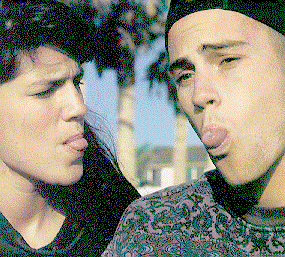 |
|
35. Having a “widow’s peak” is DOMINANT (W) over a straight hairline (w). Show offspring of a cross between TWO parents that are both HETEROZYGOUS for the WIDOW’S PEAK allele.
Image from: http://facstaff.uww.edu/wentzl/geneticsfeb02.html
|
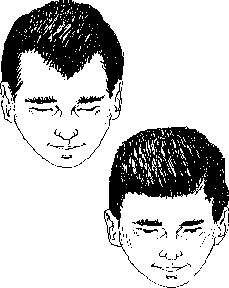 |
|
36. In humans which combination of sex chromosomes makes you a female? |
http://www.angelbabygifts.com |
37. X linked traits like hemophilia or colorblindness show up more frequently in ______________. (males females)
38. The chromosomes that DO NOT determine sex are called ________________.
39. The branch of genetics that studies the molecules that sit on top of DNA and control which genes are turned on or off is called __________________
40. Name the chemical "tags" that are added to DNA to turn off genes.
ANSWERS:
1. Gregor Mendel
2. allele
3. B-heterozygous
4. F2
5. heredity
6.dominant
7. Mn
8. pure-breeding
9.A-complete dominance
10. TT
11. tt
12. B incomplete dominance
13. phenotype
14. recessive
15. C-codominance
16. hybrid
17. F1
18. D-heterozygous
19. polygenic
20. genetics
21. E-B type cells only have B glycoproteins
22. human height, intelligence, skin color, hair color
23. AB
24. multiple allele
25. trait
26. glycoproteins
27. Tt
28. yy (two lower case y)
29. Tt
30. RR
31. round seeds
32. white flowers
33.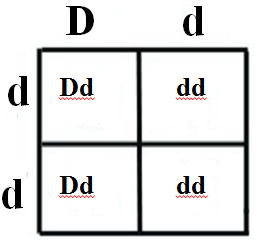 |
GENO TYPE/PHENOTYPE 50% Dd (hearing) 50% dd (deaf) |
34.
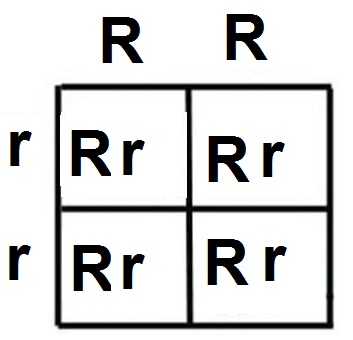 |
GENOTYPE- 100 % Rr PHENOTYPE- all tongue rollers |
35.
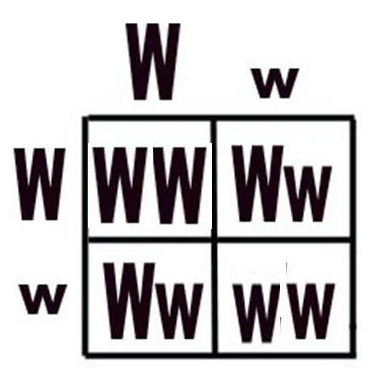 |
GENOTYPE 25% WW 50% Ww 25% ww PHENOTYPE 75% widow's peak (WW&Ww) 25% no widow's peak (ww) |
36. XX
37. males
38. autosomes
39. epigenetics
40. methyl